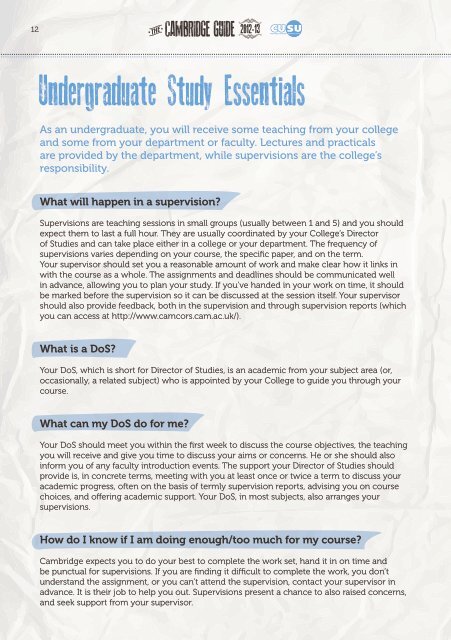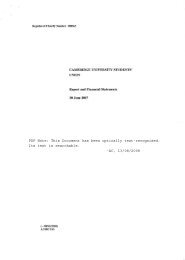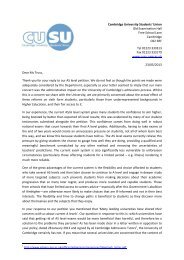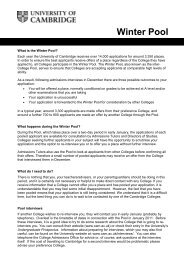The Cambridge (Survival) Guide - Cambridge University Students ...
The Cambridge (Survival) Guide - Cambridge University Students ...
The Cambridge (Survival) Guide - Cambridge University Students ...
You also want an ePaper? Increase the reach of your titles
YUMPU automatically turns print PDFs into web optimized ePapers that Google loves.
12Undergraduate Study EssentialsAs an undergraduate, you will receive some teaching from your collegeand some from your department or faculty. Lectures and practicalsare provided by the department, while supervisions are the college’sresponsibility.What will happen in a supervision?Supervisions are teaching sessions in small groups (usually between 1 and 5) and you shouldexpect them to last a full hour. <strong>The</strong>y are usually coordinated by your College’s Directorof Studies and can take place either in a college or your department. <strong>The</strong> frequency ofsupervisions varies depending on your course, the specific paper, and on the term.Your supervisor should set you a reasonable amount of work and make clear how it links inwith the course as a whole. <strong>The</strong> assignments and deadlines should be communicated wellin advance, allowing you to plan your study. If you’ve handed in your work on time, it shouldbe marked before the supervision so it can be discussed at the session itself. Your supervisorshould also provide feedback, both in the supervision and through supervision reports (whichyou can access at http://www.camcors.cam.ac.uk/).What is a DoS?Your DoS, which is short for Director of Studies, is an academic from your subject area (or,occasionally, a related subject) who is appointed by your College to guide you through yourcourse.What can my DoS do for me?Your DoS should meet you within the first week to discuss the course objectives, the teachingyou will receive and give you time to discuss your aims or concerns. He or she should alsoinform you of any faculty introduction events. <strong>The</strong> support your Director of Studies shouldprovide is, in concrete terms, meeting with you at least once or twice a term to discuss youracademic progress, often on the basis of termly supervision reports, advising you on coursechoices, and offering academic support. Your DoS, in most subjects, also arranges yoursupervisions.How do I know if I am doing enough/too much for my course?<strong>Cambridge</strong> expects you to do your best to complete the work set, hand it in on time andbe punctual for supervisions. If you are finding it difficult to complete the work, you don’tunderstand the assignment, or you can’t attend the supervision, contact your supervisor inadvance. It is their job to help you out. Supervisions present a chance to also raised concerns,and seek support from your supervisor.
















